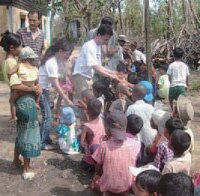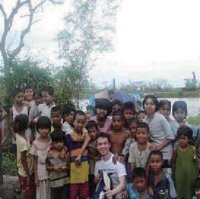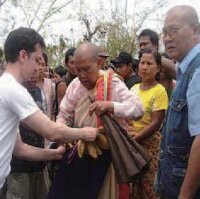| Sammy Samuels - Back to Burma/Myanmar |

|

|
|
On 2 May 2008, Cyclone Nargis hit Burma, first attacking the southern part of Irrawaddy Division, then passing through Rangoon (Yangon) and the delta areas. In its wake, the cyclone left 133,000 people dead or missing. According to the United Nations, 2.4 million people required emergency aid, but five weeks after the storm, there were people still suffering. Fortunately for me, I was living in New York, working for the American Jewish Congress. My family in Rangoon was not so fortunate, and they had to endure several hours of intense rain and wind as the storm made its way across Burma.
As it was, I was out of New York at a conference, and I wasn’t even aware that a cyclone had hit Burma until the morning of 4 May, when I received many phone calls from my friends in the United States, all enquiring about my family. I was shocked to hear the news and it took me a while to absorb the fact that my family could be in danger. Even in normal times, communications between the U.S. and Burma can be difficult, with email and telephone calls not easy to get through. This time, it took two days, until May 6th, with the help of the Israeli Embassy and the American Embassy in Rangoon, I finally received the news that my family had survived and our house suffered only minor damage to the roof, but it had been quickly repaired. While many were equally fortunate, a great number more suffered far worse conditions and had nothing left but the clothes on their backs. Some did not even have that: the storm blew them off while they clung to trees for survival as the cyclone tore away their homes and their families. While I was relieved to know that my own family was safe, I could not just stay in New York while people were suffering in Burma. As a Burmese citizen, I was able to take that advantage and go back to Burma with two suitcases full of water purifi cation tablets and other medical supplies. I spent three weeks in Burma and it was an unforgettable experience. Together with my neighbours, we went to seven villages and distributed about 1400 food bags/supplies to victims of the cyclone. Ordinary citizens have helped in the effort to clear roads to reach people in need. Many Burmese volunteers also organised their own deliveries to the delta to help their fellow countrymen.
Life is slowly returning to normal in Rangoon. The streets, once fi lled with beautiful, green trees, today are littered with torn and twisted tree limbs, but most of the fallen trunks have been pushed to one side, so traffic is flowing. Some shops and offices are open again. In the Irrawaddy Delta, half a day’s journey from Rangoon, life is far from normal. This is a desperately poor region where hundreds of thousands of people live in tiny settlements scattered amongst low-lying islands. On our way to Bogalay, we saw dead buffalo and cows floating. There is still a bad smell swirling around. Villagers in that area said that there were still bloated bodies lying uncollected near their villages. Cyclone victims from villages between Kunchangone in Rangoon Division and Irrawaddy’s Dadaye Township are keeping a daily roadside vigil in the hope of receiving aid. Villagers continued to flock to the main highways because aid workers had not been able to access the more remote villages. The villagers go back to their villages in boats at the end of the day, after they have received food for their family from the aid workers. Their buffalo and cows were killed by the storm, so it is very unlikely that they will be able to resume their routine jobs this year. A week before I came back to New York, the Myanmar Jewish community hosted an interfaith prayer ceremony for the victims of the cyclone at the Rangoon Synagogue. Leaders from the Muslim, Christian, Buddhist, Bahai and Hindu communities were invited to attend. About 100 people assembled for the ceremony and it was beautiful to see all the different religions gather together for a common cause affecting all of our people, regardless of their individual faiths. Wherever we went to distribute food bags, plastic shelters and clothing, I could see the faces of the cyclone victims light up. It was very rewarding to see smiles on the faces of people who had suffered so much. And in every cyclone-hit region I went to in Burma, I shared with the victims I met there that there are passionate people in the outside world who care about the Burmese people and whose hearts go out to them during this very difficult time.  Supplied by Sammy Samuels Sammy is the son of Moses Samuels, one of Myanmar’s last Jews and the caretaker of the country’s only synagogue. This remote Jewish community was highlighted by Jewish Times Asia in our October 2007 edition.  (Issue July/August 2008) |




















